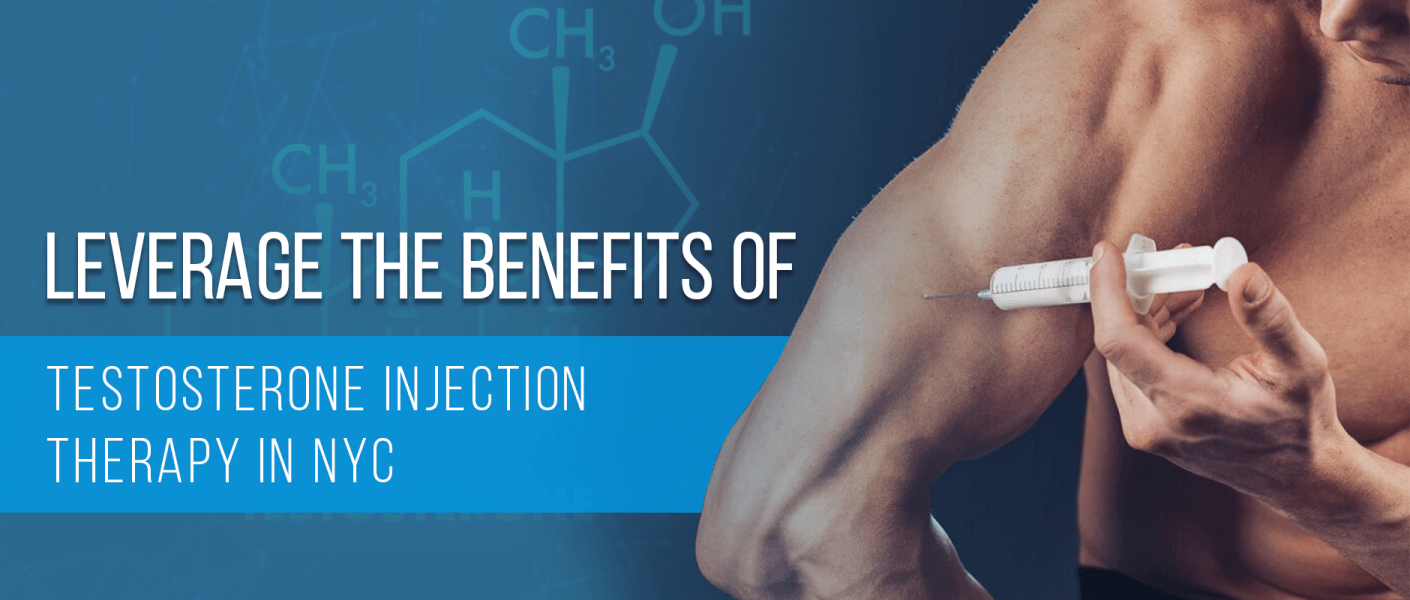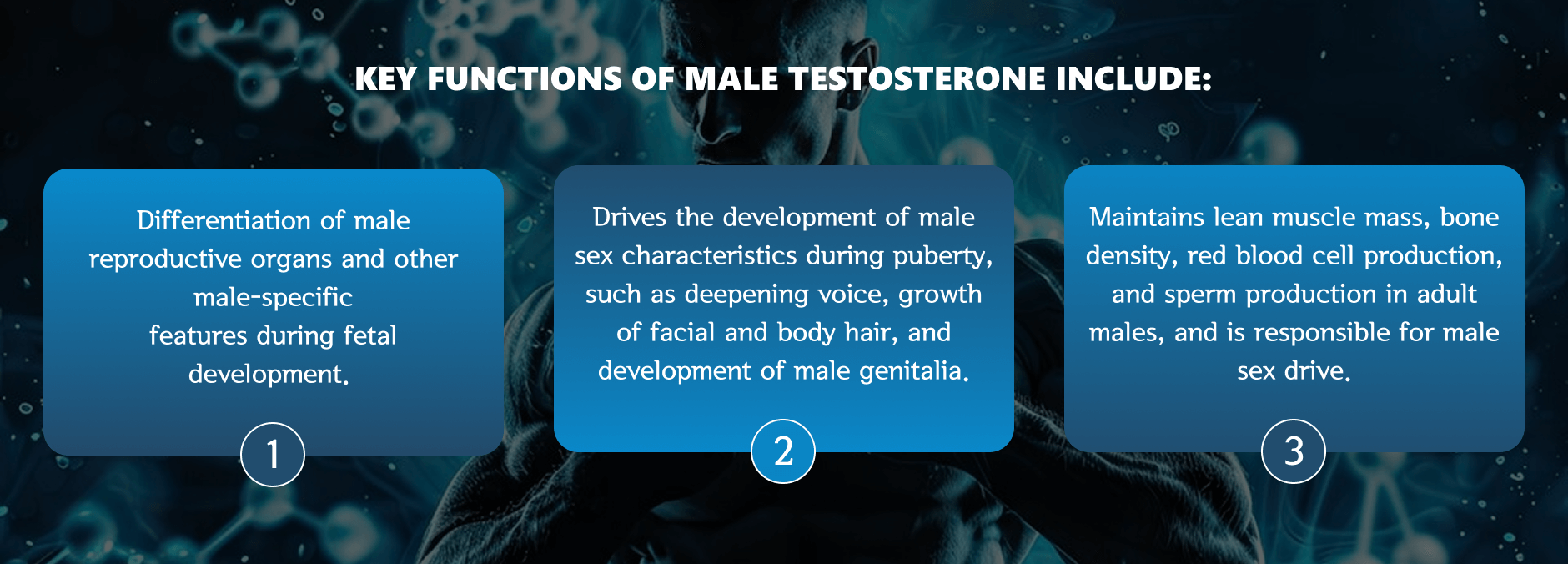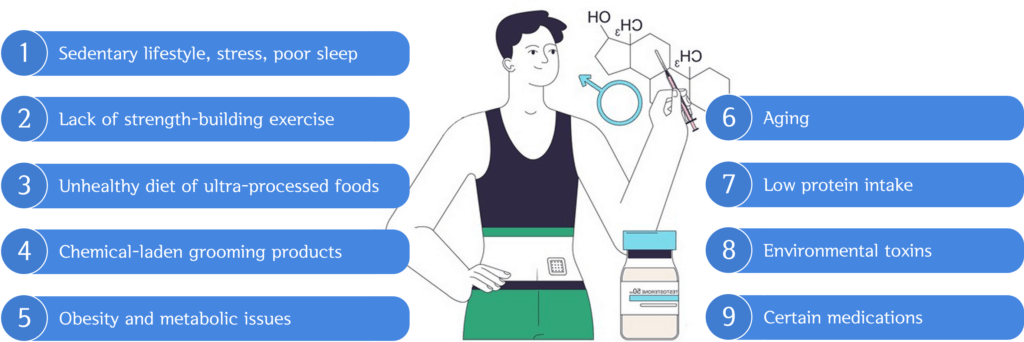 In the 21st Century, a surge in obesity and metabolic disorders, along with turbo cancers and cardiovascular events, has health officials scrambling to identify contributing factors, find solutions, and reverse alarming health trends. One important marker of declining health is a significant drop in male testosterone levels and reproductive capabilities across every age demographic.
In the 21st Century, a surge in obesity and metabolic disorders, along with turbo cancers and cardiovascular events, has health officials scrambling to identify contributing factors, find solutions, and reverse alarming health trends. One important marker of declining health is a significant drop in male testosterone levels and reproductive capabilities across every age demographic.
Learn about the vital role of testosterone in men’s health, factors contributing to declining levels, and how testosterone injection therapy can play a role in rebalancing healthy hormone levels and restoring optimal male testosterone production.
What Exactly is Testosterone?
Testosterone is a steroid hormone responsible for the development of male sexual characteristics and reproductive function. Testosterone production is controlled by the hypothalamic-pituitary-gonadal axis, where the brain signals the testes to produce it. Women also have relatively low levels of testosterone, produced primarily in the ovaries and adrenal glands, that play roles in muscle maintenance, libido, and bone health.
Testosterone plays a key role in the development of male reproductive tissues such as the testicles, penis and prostate, and drives secondary male characteristics such as increased muscle mass, greater bone density, and the growth of body hair. It contributes to the production of red blood cells and drives male libido.
Key functions of male testosterone include:
- Differentiation of male reproductive organs and other male-specific features during fetal development.
- Drives the development of male sex characteristics during puberty, such as deepening voice, growth of facial and body hair, and development of male genitalia.
- Maintains lean muscle mass, bone density, red blood cell production, and sperm production in adult males, and is responsible for male sex drive.

Historically, testosterone levels fluctuate throughout life, peaking during puberty until about age 20, and gradually declining after age 30 at the rate of 1-2% per year. However, in the 21st Century, we are seeing an alarming drop in male testosterone levels, even among teens and young men, impacting sperm count and reducing fertility – factors that many fear are setting the US on course for a population collapse.
Testosterone and Men’s Health
Testosterone is crucial to men’s physical, mental and emotional health. It regulates muscle mass, bone density, libido, energy levels, and mood. More importantly, testosterone is fundamental to sperm production and fertility, both of which have been in steady decline over the past several decades. Low testosterone levels – clinically called hypogonadism – can profoundly affect men’s health.
Signs of low testosterone include:
- Chronic fatigue
- Reduced lean muscle mass
- Erectile dysfunction
- Depression and mood swings
- Low sex drive
- Cognitive impairment

To optimize physical and sexual performance and increase muscle size, some men turn to supplements that artificially boost testosterone levels, but too much of a good thing can have its downsides. Personalized clinical testosterone therapy is recommended to elevate and balance baseline hormone levels without triggering undesirable side effects.
Today’s Alarming Decline in Male Testosterone
In the 2020s, multiple studies have shown that male testosterone levels in the United States have been declining compared to prior decades. Testosterone production peaks in adolescence and young adulthood, then naturally declines as men age. But one study published in 2020 looked at 4045 data samples and discovered that testosterone deficiency affected at least 20% of male adolescents and young adults.
Testosterone deficiency can profoundly affect key male health markers, such as:
- Sexual performance
- Male fertility
- Libido
- Lean muscle mass
- Energy production
- Bone density
- Basal metabolic rate
- Cognitive function
Multiple factors can adversely affect male testosterone production:
- Lifestyle factors like sedentary behaviors, stress and poor sleep habits
- Lack of muscle-building physical activity
- Poor diet of ultra-processed foods deficient in nutrients
- Insufficient protein consumption
- Obesity and metabolic disorders
- Aging
- Chemical-laden personal grooming products
- Environmental toxins from food, air and water, such as phthalates, bisphenol A (BPA), polychlorinated biphenyls (PCBs), dioxins, pesticides, heavy metals, and microplastics
- Pharmaceutical drugs, including statins, antidepressants, chemotherapeutics, opioids, steroids, antifungals and certain hypertension medications

Particularly alarming is the effect of drugs like SSRIs – a class of antidepressants that are widely prescribed to young people to help manage teenage angst. One study of over 12,000 men aged 21-49 who were treated with antidepressants noted a significant risk of irreversible erectile dysfunction associated with the most commonly prescribed class of antidepressants.
A 2024 report published by the Australian Department of Health, Disability and Aging warns about chronic and persistent sexual dysfunction, marked by erectile dysfunction, premature ejaculation and low sex drive. These symptoms not only manifest while taking SSRIs, but can persist indefinitely after discontinuing the medications. The report’s warnings are supported by research on SSRIs and their impact on testosterone levels.
The nationwide decline in male testosterone also correlates with rising rates in obesity and associated metabolic disorders like diabetes and hypertension. One research article describes in detail the mechanisms of low total testosterone in obese men, linking it to insulin resistance and associated reductions in sex hormone-binding globulin.
Natural Ways to Boost Testosterone
While age-related declines in testosterone are normal, reduced testosterone production in young men is mostly related to lifestyle factors. Modifying daily lifestyle behaviors can help to gradually balance and normalize hormonal balance and elevate testosterone levels.
Factors that naturally boost male testosterone include:
- Regular exercise, especially resistance training and high-intensity interval training (HIIT). Target major muscle groups 3-4 times per week, but avoid overtraining, which can temporarily lower testosterone.
- Switch to a high protein diet of pasture-raised meats and wild-caught fish, with healthy fats like avocados and olive oil. Avoid processed foods and seed oils.
- Get 8-9 hours of quality sleep nightly – consistency is key.
- Manage stress by deep breathing, spending time in nature, meditating, or other activities that help you relax.
- Attain and maintain a healthy weight.
- Avoid or limit medications and alcohol consumption.
- Expose your skin frequently to unfiltered sunlight, without toxic sunscreens.
- Avoid environmental toxins from plastics, heavy metals, personal grooming products, and aerosols.
Restore Hormonal Balance with Testosterone Injection Therapy
In addition to making lifestyle changes, some men may benefit from testosterone therapy to achieve and maintain optimal testosterone levels. In addition to supporting male sexual function, testosterone injections can help slow aging, support cardiovascular health, and promote sustained energy production.
Prior to taking testosterone supplements, you should have your serum levels evaluated, and look for a reputable clinic that provides customized services, to ensure you get the most effective dose at the right frequency. Periodic testing should be done to avoid over-supplementation.
Too much testosterone can cause aggression, promote acne, and increase the risk of heart disease and prostate issues. Anabolic steroids or unregulated supplements can shrink testicles, reduce sperm count, and increase the risk of cardiac events.
Get Personalized Testosterone Therapy in Manhattan NYC
Testosterone deficiency is on the rise, especially in male teens and young adults. Long-term deficiency can dramatically affect your quality of life, including your ability to have children. At Invita Wellness, we take a customized, lifestyle-centered approach to testosterone therapy.
Our personalized services include:
- Lab testing and assessment
- Lifestyle coaching
- Advanced wellness therapies
- Ongoing support
Don’t let symptoms of low testosterone keep you from enjoying your life to its fullest – contact Invita Wellness today, and get the personalized support you need to balance your hormone levels and restore optimal testosterone production.
Get Testosterone Therapy in Manhattan NYC
contact InVita Wellness today
Book Now
456 Broadway 2 Floor, New York, NY 10013, USA
Resources
Ben-Sheetrit, Joseph, et al. “Estimating the risk of irreversible post-SSRI sexual dysfunction (PSSD) due to serotonergic antidepressants.” Annals of general psychiatry 22.1 (2023): 15.
https://annals-general-psychiatry.biomedcentral.com/articles/10.1186/s12991-023-00447-0
Fui, Mark Ng Tang, Philippe Dupuis, and Mathis Grossmann. “Lowered testosterone in male obesity: mechanisms, morbidity and management.” Asian journal of andrology 16.2 (2014): 223-231.
Lowered testosterone in male obesity: mechanisms, morbidity and management
Jin, Haibo, et al. “Chronic exposure to polystyrene microplastics induced male reproductive toxicity and decreased testosterone levels via the LH-mediated LHR/cAMP/PKA/StAR pathway.” Particle and fibre toxicology 19.1 (2022): 13.
Chronic exposure to polystyrene microplastics induced male reproductive toxicity and decreased testosterone levels via the LH-mediated LHR/cAMP/PKA/StAR …
Lokeshwar, Soum D., et al. “Decline in serum testosterone levels among adolescent and young adult men in the USA.” European urology focus 7.4 (2021): 886-889
Decline in serum testosterone levels among adolescent and young adult men in the USA
Pavlidi, Pavlina, Nikolaos Kokras, and Christina Dalla. “Antidepressants’ effects on testosterone and estrogens: What do we know?.” European journal of pharmacology 899 (2021): 173998.
https://www.sciencedirect.com/science/article/abs/pii/S0014299921001515